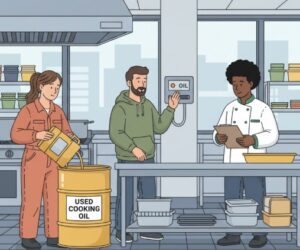
Top 10 Frequently Asked Questions About Used Cooking Oil Recycling

Recycling used cooking oil is an important practice that benefits the environment and local communities.
People often have many questions about handling and recycling their cooking oil properly.
Understanding how to recycle used cooking oil can help prevent environmental damage and create new opportunities for sustainable practices.
This article will guide readers through the top 10 frequently asked questions about used cooking oil recycling.
1) What is used cooking oil recycling?

Gathering and recycling cooking oil that has already been used for cooking is known as used cooking oil recycling.
This process helps prevent the oil from being dumped in landfills or poured down drains, which can cause environmental damage.
The recycled oil can be converted into biodiesel, an alternative fuel that reduces reliance on fossil fuels. Biodiesel is biodegradable and burns cleaner than conventional diesel.
Another essential use of recycled cooking oil is in producing animal feed and industrial lubricants. This reduces waste and promotes sustainability.
Recycling used cooking oil requires filtering and storage correctly. Filtering food particles with a fine mesh strainer helps maintain the oil’s quality.
2) Why is recycling used cooking oil necessary?
Recycling used cooking oil helps protect the environment. When improperly disposed of, cooking oil can pollute soil and water, harming ecosystems. By recycling, pollution is reduced, and natural resources are preserved.
Recycling used cooking oil also lowers repair costs. Proper disposal prevents plumbing issues like clogs and cracked pipes, avoiding expensive repairs. It ensures smoother kitchen operations.
Used cooking oil can be turned into renewable fuels. These fuels serve as a substitute for fossil fuels, reducing dependency on non-renewable energy sources. This supports a more sustainable future.
Recycling creates jobs in the community. The process involves collection, transportation, and conversion, providing employment opportunities and supporting local economies.
Recycling protects businesses, especially restaurants, from odors and rodent problems. Proper handling reduces smell and prevents pests, maintaining a cleaner environment.
Take action now and schedule your grease pickup with GreasePros – keep your kitchen clean and the environment greener!
3) How is used cooking oil recycled?

Used cooking oil is recycled through several steps. First, the oil is filtered to remove food particles, keeping it cleaner and better for further use.
Next, the filtered oil is collected in leak-proof containers, often labeled to avoid accidents. The oil should be stored in a cool, dark place until it can be taken to a recycling facility.
At the facility, the oil undergoes a process called transesterification. This chemical reaction transforms the used cooking oil into biodiesel, a renewable energy source used in engines and heating systems.
Some facilities use recycled cooking oil to make lubricants, soaps, and animal feed. Recycling used cooking oil conserves resources and reduces waste.
4) Can I recycle used cooking oil at home?
Yes, you can recycle used cooking oil at home. One way is to designate a container, like a metal coffee can or plastic butter container, to store used oil. Make sure it is labeled correctly to avoid accidents.
You can also use used cooking oil for lamps as it is a good source of fuel, which can save money on lamp oil. Furthermore, some people use used oil for polishing furniture.
Filtering the oil through a fine mesh strainer to remove food particles can also help. Storing the oil in a dark place prevents light exposure, which can break down the oil faster and affect its quality.
Another option is to reuse the oil for cooking. Just ensure it is appropriately stored and strained. This practice not only reduces waste but can also save on cooking expenses.
If you’re ready to get started, call us now!
5) What products can be made from recycled cooking oil?
Recycled cooking oil can be transformed into many valuable products. One of the most popular uses is creating biodiesel. Biodiesel is a cleaner-burning fuel that helps reduce pollution. Used cooking oil is processed through transesterification to make this renewable energy source.
Another product that can be made from recycled cooking oil is lamp oil. Lamp oil provides a cost-effective fuel for oil lamps. This can be especially useful for those looking to save money on lighting.
Recycled cooking oil is also used to produce soaps. The oils are processed and mixed with other ingredients to create various types of soap. This helps reduce waste and is a valuable household product.
Used cooking oil can be used as a wood treatment or polishing agent. It helps protect and shine wooden furniture and other items, making them look better and last longer.
6) Where can I find recycling centers for used cooking oil?
Local recycling centers are a reliable option for disposing of used cooking oil. Many cities have specialized facilities that accept cooking oil.
Another helpful resource is your city’s waste management website. Many municipalities provide information about cooking oil recycling programs and drop-off locations.
Before taking your oil to a center, it’s a good idea to check for any specific guidelines or preparations required.
Some grocery stores and restaurants also offer recycling services for cooking oil. It’s always worth asking at your local store or nearby eateries if they accept used oil for recycling. This allows for convenient and responsible disposal without a special trip.
Contact local environmental organizations if you need help figuring out where to start. They often know about various recycling initiatives in your area.
7) Are there specific containers for storing used cooking oil?
Yes, there are specific containers designed to store used cooking oil. These containers often come with features that make them safe and practical for this purpose.
One popular option is the OGGI Cooking Grease Container, made of stainless steel with a 1-gallon capacity. Its material and size make it safe and durable.
Another practical choice is using Mason Jars with screw-on lids. These jars are easy to seal and store, keeping the oil fresh.
Typical grease disposal containers come in 55-gallon drums, 140-gallon containers, and 240-gallon containers.
If you’re ready to get started, call us now!
8) How often should I recycle used cooking oil?
Recycling used cooking oil should be done regularly to prevent buildup and ensure proper disposal. If you cook frequently, consider recycling it every month.
For occasional cooking, it’s best to recycle once the container you’re using for storage is full. A practical container size is around 1-5 gallons.
Storing oil in a cool, dark place helps prevent it from breaking down prematurely, prolonging its usability before it needs recycling.
Consistently recycling helps avoid environmental harm and maintains kitchen hygiene. Regular practice also makes the process more manageable over time.
9) What are the environmental benefits of recycling used cooking oil?
Recycling used cooking oil has several positive effects on the environment. Improper disposal of cooking oil can lead to soil and water pollution. Recycling reduces the risk of contaminating water sources and harming aquatic life.
Another benefit is reducing landfill waste. When recycled, used oil can be turned into biodiesel or other products, lowering the trash in landfills. This helps reduce methane emissions, which significantly contribute to climate change.
Additionally, recycling cooking oil helps reduce greenhouse gases. Biodiesel made from recycled oil emits fewer pollutants compared to traditional diesel.
Lastly, it minimizes the need for new resources. Recycled oil can be repurposed, decreasing the reliance on fresh raw materials and minimizing overall environmental impact.
Turn your used cooking oil into a green initiative – contact GreasePros today and join the eco-friendly movement!
10) Is there a financial incentive for recycling used cooking oil?
Yes, there is a financial incentive for recycling used cooking oil. Businesses and households can often sell used cooking oil to recycling companies. These companies then process the oil into biodiesel or other products.
Recycling used cooking oil can reduce disposal costs for restaurants and commercial kitchens. It helps avoid plumbing issues and related repair expenses.
Some programs offer rebates or credits for recycling cooking oil, making recycling an attractive option. Recycling used cooking oil can save money and generate income for businesses and individuals.
Contact Us Today For An Appointment
Don’t Let Your Grease Go to Waste – Recycle with GreasePros!
Imagine transforming your kitchen waste into a cleaner environment. With GreasePros Recycling, you don’t just dispose of used cooking oil; you contribute to a sustainable future.
Our reliable pickup services ensure your grease is handled responsibly, preventing environmental damage and costly plumbing issues. Whether you need scheduled pickups or emergency retrievals, GreasePros has got you covered.
Join the many satisfied businesses that trust GreasePros for their eco-friendly recycling needs. Don’t let your used oil become a problem – let it be part of the solution. Contact us today and make a positive impact!





